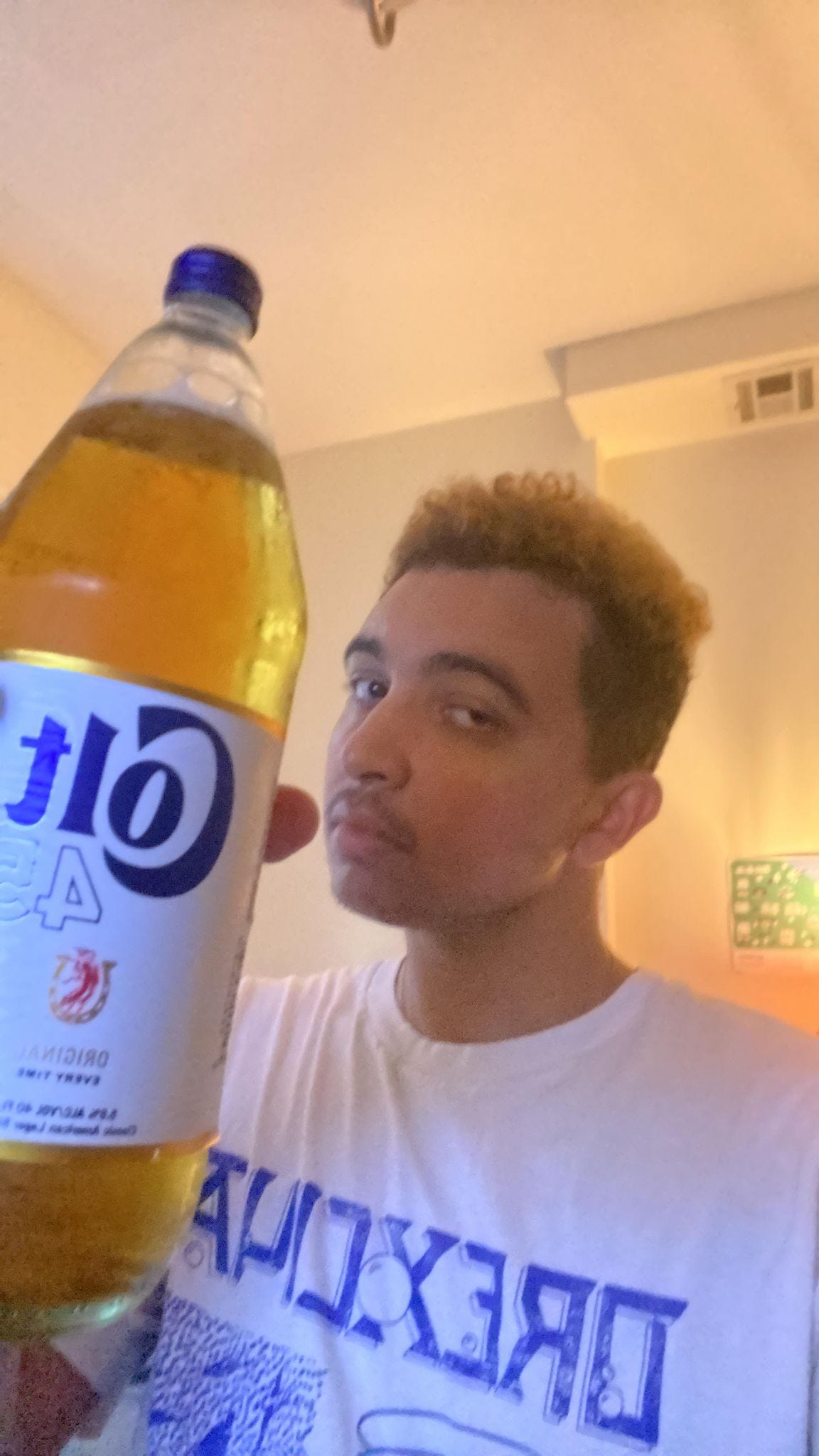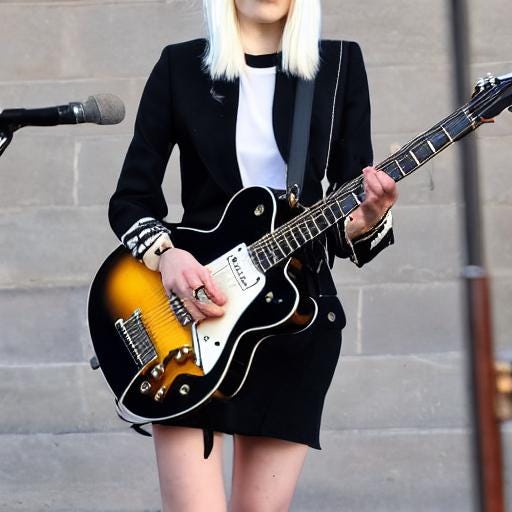Every day, across the internet, music writers are working overtime to convince you mediocre shit is Actually Good. There are plenty of reasons for this: ads to sell, quotas to make, clout to chase, affinity for underrated and marginalized artists. But when white women making cheugy guitar-pop are christened “an extended counterpoint to heteropatriarchal ideas about feminine friendship,” or Beyonce Knowles-Carter’s Casio presets are heralded as “homage to the true safe places for many of her fans,” you kind of have to wonder what the heck is going on.
Pop critic Eli Schoop interrogates music as eagerly as context. Most often, he probes the gulfs between quality and reception, assaying his subjects with decisive strokes. On boygenius: “no more identity politicking for what amounts to if Refinery29 made music.” On RENAISSANCE: “brimming with great Instagram captions and utterly soulless.” On Bartees Strange: “fallow music, destined to fall away from your ears as soon as it ends.” Eli’s project is bolder than mere contrarianism, yet the exasperation is well-earned — calling bullshit is a sign you actually care.
In addition to his Substack Constantly Hating, Eli’s contributed to No Bells, Tone Glow, and Bandcamp Daily. He’s also a contributing editor at the Cleveland Review of Books. In this installment of TR Pen Pals, we discuss reading habits, P****e B******s, and encountering past selves online.
Pete: Anytime I encounter critics younger than me, I'm curious about their paths to music writing — not because it's necessarily a waning medium, but the infrastructure's collapsed and it feels like a vestige of a disappearing internet. I gather you were writing online from a young age. How did you decide music criticism was a space you wanted to occupy? What were you reading and listening to at the time?
Eli: So, I think I became a music writer because I had always had this fixation on analysis and criticism — when I was a kid I wanted to be a sportscaster cause I loved ESPN, then a sports writer, and as I got more and more into music and discovered Pitchfork, a music critic. I'm probably from the last era of kids that grew up with some analog influences, the Charles Cross Nirvana and Hendrix biographies are big ones, and growing up near the Rock Hall made that dream a possibility. Once I started getting into /mu/core type things I realized how potent music writing can be, how it informs taste and mindsets toward the music, and I really wanted to imbibe as much quality stuff as I could because of it. Sufjan and Animal Collective were parts of that, but also CityCop and Circle Takes the Square and Signals Midwest and Bomb the Music Industry, stuff I thought was excellent but never got the wider recognition it deserved, and that fact is what compels me to highlight weird outre art in the present day.
Pete: What's your relationship with the Rock & Roll Hall of Fame? I feel like I only encounter critical accounts in the media — people mad about the latest honorees, or its general white-gazey exclusion — but I have no idea what the exhibits and programming are like. I remember when I was twelve, pretty much just listening to whatever was on Hot 97, and we went to a Hard Rock Cafe on vacation, and I was like this is corny but also there's this sick '80s-ass band called Def Leppard and now I wanna know everything about them. Did the Rock Hall shape your taste, for better or worse?
Eli: So the Rock Hall to me, while corporate and sterile, really gives good light to all these different movements going on throughout music and has some of the best memorabilia I've ever seen at any museum. Outfits from Prince, MJ, Dolly, Funkadelic, shit is just mad cool. And they're def starting to highlight more diverse perspectives, especially with that Jann Wenner debacle, despite it still being US/UK-centric. It never shaped my taste but I think its proximity to me def felt like a blessing in a more understated yet significant way, giving me access to the wider industry even if as an outsider.
Pete: Based on your criticism — especially the stuff you've self-published, or written for blogs like No Bells and Tone Glow — I imagine outlets like Pitchfork and Stereogum must seem hopelessly cheugy. At this stage of the game, do you attribute any value to these old-line music pubs? Which outlets and writers do you look forward to reading nowadays?
Eli: There's a fair few writers I enjoy on P4K and Stereogum; Alphonse Pierre, Philip Sherburne, Arielle Gordon, everyone from Tone Glow who freelances for both. But there definitely feels like this market-tested quality to both (Pitchfork moreso) that is really off-putting and ultimately antithetical to good criticism. I'm probably never going to write for them since I stir shit too easily but compared to the average music critic their taste is hesitant and falls short of the brazenness that marked the older site (no nostalgia I swear!). Besides my friends at Tone Glow and No Bells, Samuel Hyland at https://sammysworld.org/ is preternaturally talented, 20-21 year old dude that runs his own slickass site and has interesting incisive takes on anything he puts his mind to.
Pete: I was intrigued when you published some years-old writing on your Substack — including a blog from when you were seventeen (?). Personally, I wince whenever I'm confronted by old bylines, and if anyone ever finds the blogs I wrote in high school I will probably never go out in public again. Do you find it instructive to read old work? Any concerns about leaving a paper trail online?
Eli: I wouldn't say instructive, rather it's kind of a nice reminder of my growth as a writer and person. I doubt that anyone would try and roast me over reviews I did as a 17-year old, and if they did they'd be a major herb. I was too reticent as a kid to blog online despite getting encouraged by my parents, but kids should really do it, to be engrossed in that type of mentality is pretty healthy for an adolescent I think. Still, one of my favorite reviews of all time was written by a friend of mine in his senior year on a Vektroid side project, sometimes you're young and really fucking good.
Pete: I saw you recently moved to New York? What drew you east? Has anything surprised or disappointed you as you encounter the city with fresh eyes?
Eli: Cleveland is a city but a small city nonetheless, and I needed to leave. I had a lot of friends and colleagues in New York and it felt like a natural fit for me since I spent half my childhood in Chicago. And it's been a fucking blast! There's literally something to do every day which sucks for my wallet but rules in every other way. Writing jobs don't exist anymore but maybe in the future one will open up here, right?
Pete: God I hope so. OK I need to ask about boygenius! Their music sucks in ways that seem obvious and immediate. Your essay on the record interrogated the album's shortcomings, as well as its promotion and reception. As the dust settles and the band continues to pack arenas, I remain bewildered as ever — it'd be one thing if a kinda-okay record by internet darlings prompted this reaction, but their shit aggressively sucks. Is it more of a big-tent record than I realize, or just a marketing coup? Why do you think the media and internet were so eager to anoint this project?
Eli: I think this is a failure on critics' part. There is still a hankering for "rock" or guitar bands, in whichever forms they come, and boygenius fit the bill, especially with their non-threatening sapphic schtick being particularly appealing to 18-25 year-old female bisexuals. I don't think their success is illegitimate, I mean they played MSG! But that aspect of marketing that you touched on supersedes the actual music. It's the same thing with Taylor Swift, people attach their identities to this #relatable music whether it's good or not, and thus become fervent stans that fall on the sword for them. Critics just need to be more discerning in every aspect on the real, like there's no fucking reason this band should get good reviews lmfao. Have some self-respect, dear god!
Pete: It reminds me of when Chance the Rapper had the #1 record in America, and all the press was about what an incredible achievement it was for an “independent” artist. Like, his face is on the homepage of every streaming platform, it doesn’t matter who’s uploading his shit to DistroKid! This boygenius press cycle seems focused on everything but the music, and it’s spooky to see the Taylor Swift Brand Activation model applied so successfully to P4K-core artists.
I wrote some stuff for the Cleveland Review of Books years ago when it was getting off the ground, and it's been cool watching the magazine come into its own. What's been your role on the editorial team? Were you involved like, on-the-ground back in Ohio? What sort of community exists around the magazine, and what would you like to see it accomplish?
Eli: So I met Billy after I wrote a piece on Cleveland's cultural capital for CRB, and he wanted to link and discuss further steps for the publication. I wasn't sure it was going anywhere until he got to New York and started aggressively networking and really cultivating literary clout. Dude is an absolute lad and I'm super psyched that he's assembled such a talented team of editors around him, notably the EIC Zach Peckham, who works at the Cleveland State Poetry Center and is an all-around sweetheart and excellent talent. I'm periphery on CRB, sometimes fielding pitches and sending them over to the team, but I've always got their ear so that's nice. Cleveland Review owns because it doesn't feel exclusionary or snobbish, and exists as this unique sort of publishing entity that just wants to uplift writers without gleefully attaching their own name at the front. A lot of the time pubs will gladly take the credit front and center, and I never feel like that's the case at CRB. It's a sick endeavor.






